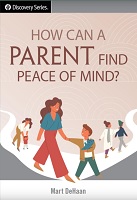
God was a perfect parent. His children, Adam and Eve, were raised in the best of environments. Yet they threw it all away, went the way of the snake, and gave birth to a murderer.
Then came Israel, a nation whom God loved dearly and cherished deeply. Yet it repeatedly became the incorrigible, rebellious child.
Ezekiel the prophet assumed that a good parent can have a child who turns out bad. He also reminded us that a bad parent can have a child who turns out good. He argued long and hard against a deterministic relationship between parent and child (Ezekiel 18:1–28).
How Can A Parent Find Peace of Mind?
Get our latest parenting resource!
Our latest resource, How Can a Parent Find Peace of Mind?, is now available.
Every month, we roll out a new resource for families. Subscribe to our email updates, and be the first to get a copy!
This idea runs against the grain of what we often expect in parent-child relationships. When we see a child from a good family turn out bad, we quickly conclude that there must have been a dark side of parental neglect somewhere. That might well be true.
Good parenting doesn’t guarantee good children. It only assures that our children will have the tremendous advantage of having had a good parent.
But what about the children who come from troubled homes and turn out great? Are we as quick to think that there must have been some redeeming parental virtue that we didn’t see? Or are we inclined to think that the child rose above his roots and decided that he was going to be different?
Good parenting doesn’t guarantee good children. It only assures that our children will have the tremendous advantage of having had a good parent. The truth is that if we do well, what our children will be blessed with is a good foundation.
Here’s 3 things to think about as you continue building this precious foundation in your kids:
1. Train with Love
If you’ve ever had to train a family pet, you might find that it’s a bit like raising a child. Before you think this comparison might be insulting, think about it: What does it take to teach a dog to sit up, roll over, and do a few tricks? Will it be enough to shake its collar, yell, or tear it down with insults? Or will you have a better chance of success if you give it a treat and warm praise?
Training a child is similar. Laying down the law, threatening him with punishment, and pulling rank by saying, “Because I’m your father and I said so!” will only work for a while. After that, all the threats in the world will not work. They may even incite him to rebel, either in your face or behind your back.
Children cannot be forced to be good—not indefinitely, at least. In time, they will begin doing what they want to do, whether you like it or not. The key is to help them want to do the right thing, so as to meet God’s standards as well as their own needs.
Everyone wants to be free, to be important, and to be appreciated.
Everyone wants to be free, to be important, and to be appreciated. Begin by helping them to feel really cared for. Encourage them. Spend time with them. Do what they enjoy doing. Hold them. Hug them. Do things for them that will show them that they are in your heart, and that they are in your heart for their good.
Don’t just give them love. Give them boundaries designed to protect their freedom. Show them what happens to people who refuse to live under the wise and loving rule of God. Find creative ways of showing them that the counsel of the Word of God has been given to us to meet our deepest needs and wants.
As a parent, you will avoid much frustration by realising the importance of giving your children good reasons and incentives for right choices. They need to see how these reasons and incentives fit their need for pleasure, importance, freedom, and appreciation.
2. Live by a Contract
Wise parents try not to make their children behave. They realise that they cannot force their children to be good any more than a horse can be forced to drink water. You can lead the child to be good, but you can’t make him good.
This is not to say that you don’t have to make children do things they don’t want to do. There are exceptions, especially in the early years.
One of the most important lessons to be learned as a parent is mirrored in the way God deals with His children. He is a contract-making God. He tells us what will happen if we do what He tells us to do. Then He tells us, with sufficient specificity, what will happen if we refuse.
He offers to help us make good choices if we ask Him for wisdom and readily offers to help us do anything He wants done that we cannot do on our own.
Central to God’s whole relationship with His children is the matter of choice. If His children go bad, it is their choice to do so. When they suffer the consequences, it is because they knowingly chose to go against His will.
Central to God’s whole relationship with His children is the matter of choice.
Put this in a parenting relationship. This is the opposite of trying to make all of our children’s decisions for them, and then trying to jump in and protect them when they have made bad choices. It is also the opposite of just trying to make our children do what we want them to do.
The best we can do is to show them clearly what we expect, and within what period of time. Tell them what will happen if they obey. Tell them what will happen if they don’t. Then let them choose the consequences.
If they end up being grounded, if they lose television privileges, if they are not allowed screen time, if they have to go to bed an hour early, or if they are not allowed to go with the family to an outing—it’s because of their choice, not ours.
Teaching our children to choose their own path, and then letting them experience the pleasurable or painful results of their own choices, is one of the most important things we can do—not only for them, but also for our own peace of mind.
It means that we can stop yelling, threatening, and repeating ourselves. It means we can stop complaining and nagging to pick up the pile of clothes in their room. It means we can lower our voice and be civilised about our expectations.
It is to say: “From now on, children, you choose how it will be with you. As God fathers us, so we will parent you. We’re here for you, but on these terms. It’s your move.”
3. Work like a Farmer
In many ways, parenting is like farming. It’s about ploughing, digging, raking, and planting. It’s about weeding, cultivating, and irrigating. It’s about waiting for the sun and the rains to bring the growth. At harvest time, you might have a bumper crop. Or it might be wiped out by bugs, disease, too much rain, or too little.
That’s not to say that farming is just a game of chance. Farming can be very scientific. A good farmer is a hard worker who knows what to do with the specific crops or animals he’s raising.
Peace of mind is found not in trying to force quick growth, but in realising that parenting is a long process of providing what our little ones need, while waiting on them and God for the results.
A good farmer is also a humble man. He knows his cash crop, but he doesn’t presume upon the outcome. All he knows is what his responsibility is at each step of the way. If he gets a bumper crop, it’s because he did the right things that were under his control, and also because the things that weren’t under his control fell in line.
The apostle Paul alluded to this farming model in 1 Corinthians 3:5–6:
“What, after all, is Apollos? And what is Paul?
Only servants, through whom you came to believe –
as the Lord has assigned to each his task. I
planted the seed, Apollos watered it,
but God has been making it grow.”
While Paul wrote this in the context of spiritual parenting, it is applicable to raising children, too. In both cases, we need to do the right thing, work hard, wait on God for the harvest, and realise
that we will be rewarded—not for the results, but for the loving nurturing we have given our kids.
Peace of mind is found not in trying to force quick growth, but in realising that parenting is a long process of providing what our little ones need, while waiting on them and God for the results.
Letting Go Is Hard . . . But Necessary
No one said that bringing children to maturity would be easy.
It’s hard to give your children more and more freedom with less and less control so that they can begin to feel the responsibilities of maturity.
It’s hard not to jump in and rescue them when they get themselves in trouble.
It’s hard to remain firm in providing reasonable boundaries and controls so that they are not left entirely on their own.
Good parenting is the result of Christlike character.
It’s hard to continually help them to see that the real issue is not what you want them to do, but what they are going to choose and with what consequences.
It’s hard to be patient and give them as much time as they need to grow up.
It’s also hard to pray for them daily, in a way that reflects our surrender to God. It’s hard to say to the Lord: “Do whatever it takes to bring my children to You and to maturity of faith and love. Lord, do whatever it takes.”
Good parenting is the result of Christlike character. If we follow Christ’s lead and that of the apostle Paul (2 Corinthians 4:1–12), we will see the difference that Christ’s Spirit can make in us. Only when we die to ourselves, do our children get the benefit of Christ parenting through us.
Extracted and adapted from How Can a Parent Find Peace of Mind? © 2020 Our Daily Bread Ministries




